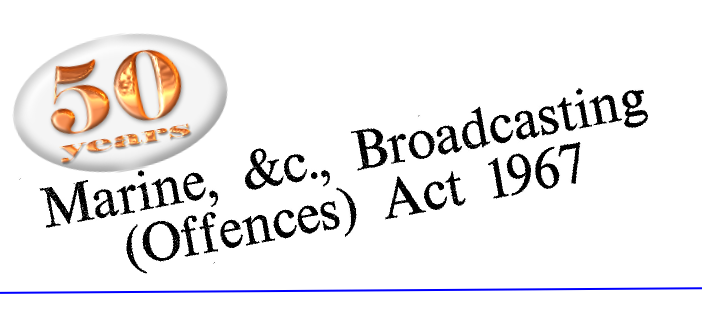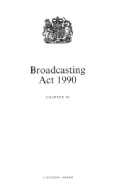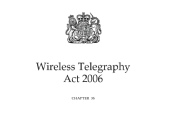© 2014-

LEGISLATIVE AMENDMENTS
Since 1967 there here have been changes made to legislation contained in the MOA in the light of the authorities’ practical experience of trying to silence offshore radio stations, particularly during the 1980s.
These changes ultimately resulted in 2006 in the repeal of the Marine etc Broadcasting (Offences) Act 1967 and the incorporation of its provisions in a much larger Act dealing with many aspects of the regulation of British broadcasting.
1. The Marine etc Broadcasting (Offences) Act 1967 was first strengthened by amendments in the Broadcasting Act 1990:-
• the application of the Act was extended to offshore structures (other than ships and aircraft), to ships registered in a foreign country, to vessels in ‘any area of the high seas prescribed for the purposes of this section by an order made by the Secretary of State’ and to waters ‘in a designated area within the meaning of the Continental Shelf Act 1964’
• the police, Customs and Excise Officers, British Sea Fisheries Officers, members of the armed forces and ‘persons authorised by the Secretary of State’ were authorised to board, search and seize any ship and arrest any person suspected of engaging in broadcasting -
• the maximum jail term for offenders on summary conviction was extended from 3 to 6 months, (although the maximum fine remained at £400).
• the ‘management, financing, operation or day-
During the course of the debate in the House of Lords, much concern was raised about the strength of the powers contained in the Bill, which were clearly aimed at silencing Radio Caroline, then the only offshore radio station broadcasting to Britain.
In the Second Reading debate on 5th June 1990 Lord Annan expressed particular concern about the clause in the Bill aimed at closing Radio Caroline :-
“……. I particularly dislike the extraordinary amendments to the Marine Broadcasting Act 1967 which are aimed at Radio Caroline. The amendments proposed will make it unlawful for any foreign ship on the high seas to broadcast to the United Kingdom. It will enable the police, the army, Customs officers and anyone who is authorised by the Secretary of State to board and search these foreign ships and to seize documents.
Is this not another example of the Government putting on their Clause 28 "bovver boots"? Exceptional cases such as highjacking or drugs could justify seizure or detention of a foreign vessel and confer immunity on the officers who boarded it. I realise that the Home Office regards Radio Caroline as a maddening wasp and is infuriated that its attempts over the years to swat it have failed. However, surely this station is not a wasp but a common or garden cabbage white. Why break a butterfly upon the wheel? Why run the risk of an embarrassing diplomatic confrontation? That could perfectly well happen if the vessel turned out to be under an American flag……”
When the House of Lords, sitting as a Committee, examined in detail various amendments proposed to the Bill on 25th July 1990 there was a specific debate about the contents of clause 159 which sought to strengthen the MOA.
The full text of the debate can be found here:-
Click on Act to access debate text
2. In 2006 the Wireless Telegraphy Act consolidated the powers contained in the MOA and the Broadcasting Act 1990, resulting in the repeal of the Marine etc Broadcasting (Offences) Act.
The full text of Part 5 of the Wireless Telegraphy Act 2006 (dealing with the ‘Prohibition of Broadcasting from Sea or Air’) can be found here:-
Click on Act to access text


EXHIBITION INDEX
Arguments Against Offshore Radio
Isle of Man Constitutional Crisis
Legislative Amendments



Ground
Back to










